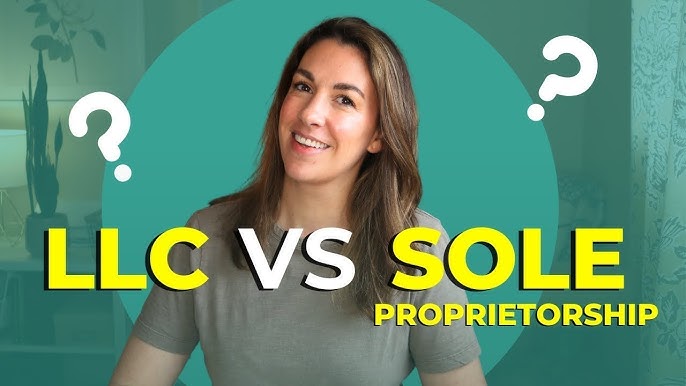When starting a business, one of the most crucial decisions you’ll make is choosing the right business structure. Two popular options for small businesses are a Limited Liability Company (LLC) and a Sole Proprietorship. Each has its advantages and drawbacks, and understanding these can help you decide which is the best fit for your business.
Understanding LLC and Sole Proprietorship
What is an LLC?
A Limited Liability Company (LLC) is a business structure that combines the features of a corporation and a partnership. It offers liability protection to its owners (known as members), separating personal and business assets. This means that members are generally not personally responsible for the company’s debts or legal issues.
What is a Sole Proprietorship?
A Sole Proprietorship is the simplest and most common form of business ownership. It’s owned and operated by a single individual, with no legal distinction between the owner and the business. This means the owner is personally liable for all debts and obligations of the business.
Key Differences Between LLC and Sole Proprietorship
1. Liability Protection
One of the most significant differences between an LLC and a Sole Proprietorship is the level of personal liability protection.
- LLC: In an LLC, members’ personal assets are protected. This means that if the company faces financial difficulties or lawsuits, the owners’ personal assets (like homes and savings) are typically not at risk.
- Sole Proprietorship: In contrast, a Sole Proprietorship does not provide liability protection. The owner is personally responsible for all the business’s debts and legal obligations. If the business faces financial trouble, the owner’s personal assets can be used to cover business debts.
2. Taxation
Both LLCs and Sole Proprietorships have distinct tax structures:
- LLC: An LLC can choose how it wants to be taxed. By default, single-member LLCs are taxed as Sole Proprietorships, and multi-member LLCs are taxed as partnerships. However, LLCs can also elect to be taxed as an S-corporation or C-corporation, allowing for more flexibility in how profits and losses are handled.
- Sole Proprietorship: In a Sole Proprietorship, the business income is considered personal income for the owner. This means the business doesn’t pay separate taxes; instead, the owner reports profits and losses on their personal income tax return.
3. Ease of Formation
The process of starting a business differs between an LLC and a Sole Proprietorship.
- LLC: Registering an LLC involves more paperwork and formalities. You must file Articles of Organization with your state and pay the required fees. Additionally, you may need to draft an Operating Agreement, outlining the rules and responsibilities of members. To start this process, visit your state’s business registration website to register an LLC.
- Sole Proprietorship: A Sole Proprietorship is much easier to set up. In most cases, you only need to register a business name with local authorities and obtain any necessary licenses or permits.
4. Costs
- LLC: Forming an LLC is more expensive upfront, with state registration fees and ongoing costs like annual reports and franchise taxes in some states. The fees for registering an LLC vary by state but can range from $50 to several hundred dollars.
- Sole Proprietorship: This is the least expensive business structure to form and operate. Costs are usually limited to registration fees, if applicable, and any necessary business licenses.
5. Control and Flexibility
- LLC: While LLCs provide flexibility in management and taxation, they also require adherence to specific rules and record-keeping. You may have members or a manager making decisions, and there can be complexities in splitting responsibilities and profits.
- Sole Proprietorship: This structure provides the owner with full control over business decisions. The owner can manage the business without consulting others, making it a great option for those who prefer autonomy.
Pros and Cons of an LLC
Pros
- Limited liability protection for personal assets.
- Flexible tax options that allow choosing the best tax strategy.
- Credibility and professionalism in the eyes of customers and investors.
Cons
- Higher costs to form and maintain.
- More paperwork and state compliance requirements.
Pros and Cons of a Sole Proprietorship
Pros
- Simplicity in setup and operation.
- Low costs to form.
- Full control over decision-making.
Cons
- No liability protection for personal assets.
- Limited growth potential due to challenges in attracting investors or raising capital.
How to Decide: LLC or Sole Proprietorship?
The decision to choose between an LLC and a Sole Proprietorship should be based on your business goals, risk tolerance, and plans for growth. If liability protection and tax flexibility are priorities, registering an LLC might be the right choice. On the other hand, if you’re starting a small, low-risk business and prefer simplicity, a Sole Proprietorship might be a better fit.
When to Register an LLC
You should consider registering an LLC if:
- You want to protect personal assets from business liabilities.
- You plan to expand the business or bring on partners in the future.
- You seek tax flexibility to optimize your earnings and expenses.
Final Thoughts
Choosing between an LLC and a Sole Proprietorship is a significant decision for your business. Each structure has its unique advantages, and the right choice depends on your business model, liability concerns, and financial goals. By understanding the key differences and the implications of each, you can make an informed decision that aligns with your long-term plans.
If you decide that the protections and benefits of an LLC are right for you, don’t forget to register an LLC with your state to take advantage of these features. Starting a business is an exciting journey, and the right structure can help set you on the path to success.
